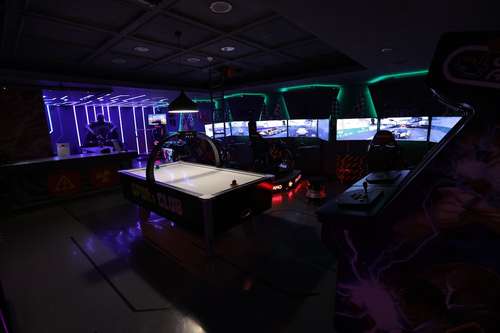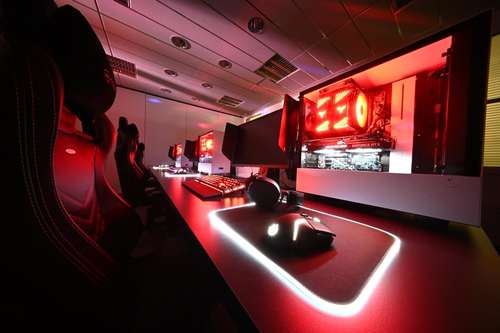Ubisoft Announces AI 'Experiment' Teammates: A Bold Step in Gaming AI
Ubisoft has recently unveiled what they are calling an 'experiment' in the realm of video game innovation—AI teammates that are set to reshape how players interact with non-player characters (NPCs). This initiative isn’t just another add-on; it marks a potential revolution in gaming AI. Fans and gamers alike are buzzing with excitement with talk of dynamic, responsive virtual allies that can truly enhance gameplay. The integration of artificial intelligence in this manner could soon lead to more immersive and engaging virtual environments.
Imagine playing your favorite Ubisoft title with blazing-fast tactics from allies that learn and adapt to your style. No longer will NPCs simply follow a preset script; these AI teammates are expected to interact in ways that mimic true human collaboration. It’s almost as if you’re inviting a new friend into the game, someone who analyzes every twist and turn of the battle alongside you. I know many of you have been curious, "What will it feel like to work with an AI collaborator?" Well, Ubisoft is about to find out.
Introducing Ubisoft's AI Experiment
The gaming world is witnessing a major shift as Ubisoft steps up its game with an innovative experiment involving AI teammates. In this section, we explore the fundamentals of this ambitious project and discuss its promise for gamers everywhere.
Ubisoft’s experiment is not just about adding a new set of characters to the game. It’s about redefining what it means to have a gaming companion in a virtual world. With this experiment, Ubisoft is harnessing advanced artificial intelligence to bring NPCs to life in ways that have never been seen before. The idea is to develop AI teammates who can learn from player actions and adjust their strategies during gameplay. This move is part of a larger strategy by Ubisoft to foster deeper engagement and offer a more personalized experience.
The studio’s commitment to evolving gaming technology is clear from their approach. Rather than sticking to pre-written scripts, these AI teammates are designed to react dynamically and collaboratively. This dynamic behavior in NPCs isn’t just an upgrade; it’s a game-changer. Gamers now have the promise of on-the-fly decision making which could lead to richer, more unpredictable gameplay experiences. It’s as if every match or mission might offer a new lesson learned, turning ordinary gameplay sessions into exciting learning experiences for both the gamer and the AI.
Dynamic NPC Allies Redefined
This section delves into how Ubisoft is set to change the way dynamic NPC teammates work in video games. Expect a blend of cutting-edge technology and creative game design aimed at delivering a truly unique interactive experience.
In traditional gaming, NPCs have often been a background element—scripted and predictable. With Ubisoft’s latest push, however, artificial intelligence is being placed at the heart of gameplay. The AI teammates are expected to provide fluid interactions that adapt to situational changes in the game narrative. By doing so, players will experience something akin to real teamwork. Instead of following a linear path, these virtual teammates offer a range of tactical support that adjusts as the battle unfolds.
If you think about it, this is similar to having a real-life sidekick with a thought process of their own. Imagine playing a strategy game where your ally not only understands your moves but also proposes strategies in real time based on the evolving scenario on-screen. This isn’t science fiction; it’s an exciting leap in AI development where Ubisoft is trying to bridge the gap between static game design and adaptive, interactive simulations.
Technology Behind the Virtual Teammates
Let’s take a quick dive into the technology that makes this experiment possible. This isn’t just about flashy graphics or realistic animations; it’s an integration of deep learning, algorithmic adaptability, and a keen understanding of game dynamics.
The engine behind these virtual teammates involves complex algorithms that adapt to player behavior. Ubisoft’s engineering team has reportedly intertwined state-of-the-art machine learning with real-time data analysis, ensuring that interactions feel natural and unpredictably exciting. This embrace of gaming AI not only signals innovation but also a push towards merging art with robust computer science techniques. The approach is very much in line with current trends in AI innovation, where technology is steadily becoming more intuitive and user-friendly.
Behind this development is a commitment to making NPCs more relatable and strategic. With simulated experiences that adjust based on gameplay metrics, the NPCs could essentially serve as both training partners and enthusiastic allies. It might remind you of the early days of co-op gaming where teamwork was central, but now with a twist of high-tech sophistication that feels personal and evolving.
Impact on the Gaming Industry
Ubisoft's announcement has sent ripples through the gaming community, raising important questions about the future of AI in gaming. This section explores the potential impact of such technology on the industry and what it means for players and developers alike.
This initiative brings forth the promise of enhanced realism and interactivity. With AI teammates, Ubisoft is setting a new benchmark for AI development, which could inspire other studios to innovate further. Think about how multi-player experiences have evolved; each improvement has led to layers of strategy and deeper immersion. The introduction of learning, adaptive NPC teammates might well be the next big leap.
There’s also an underlying current of excitement around AI collaboration. We’ve seen gradual integrations in other projects, but Ubisoft is betting big on creating a responsive virtual environment that changes with you. If successful, this approach could also influence how AI in gaming is deployed across various genres—from first-person shooters to sprawling RPGs. Players, by engaging with smarter, more responsive NPC comrades, could enjoy more nuanced challenges and feel as though they’re truly part of a living, breathing game world.
The ripple effect of this innovation might even lead to broader applications in areas like virtual reality and augmented experiences. As AI technology becomes more entrenched in the development process, the lines between scripted performances and genuine reactions will blur, granting gamers an unparalleled level of immersion and control.
A New Era of Gaming
In wrapping up the discussion on this fascinating development, this section summarizes the significance behind Ubisoft’s AI experiment and what it means for the future of gaming.
Ubisoft is not merely adding a new feature; they’re spearheading a fundamental shift in how AI is integrated into gameplay. With AI teammates, every session could feel like a fresh challenge, where the dynamics between the player and virtual ally foster an environment of constant learning and adaptation. The forthcoming AI experiment is set to challenge and redefine traditional roles within video games.
For many in the gaming community, this feels like a long-awaited next chapter in interactive design. The excitement is palpable, with gamers eagerly watching how these AI teammates will evolve in real time. What if tomorrow’s gaming experiences allowed for teammates who can truly understand and react to your gameplay style? That is the promise of this initiative—a promise of a more engaging and intuitive play environment where innovation meets creativity.
In summary, Ubisoft’s bold move towards integrating sophisticated artificial intelligence into gaming heralds a new era where NPCs are no longer background figures but critical, insightful partners in virtual adventures. The company’s commitment to pushing the boundaries of gaming technology certainly keeps us all on our toes, anticipating the next breakthrough in immersive gameplay. As we look forward to witnessing how this experiment unfolds, one thing is clear: the future of gaming is set to become more interactive, dynamic, and truly collaborative than ever before!




